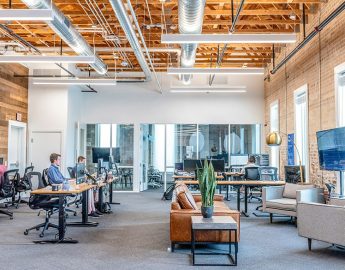Virtually any business in this day and age relies on electricity for smooth operations. Grocery stores need a large amount of it to keep frozen goods refrigerated, as do manufacturing plants that use it to sustain their current production level. Even companies whose industries don’t heavily rely on power still need electricity to keep the lights on at the workplace during office hours.
That said, overly high energy consumption can negatively impact a business in many ways. For one, it will inevitably result in high energy costs, which is an expense that can eat up a huge portion of a business’s monthly budget. Another issue is how it affects a business’s ecological footprint, because increased electrical consumption requires power plants to use more resources in order to meet the demand. Overall, this means that more harmful emissions are being produced within industries.
To do the better thing for both your company and your planet, you’ll want to see what difference you can make when it comes to rolling out energy efficiency solutions for your business. This will not only help you lower your operating costs, but also reduce your carbon footprint and improve your business’s standing among your peers, regulators, and customers.
Let’s take a look at some of the more energy-efficient solutions that you can implement this coming 2025.
1) Conduct a Detailed Energy Audit
The first step you can take towards improving your business’s energy efficiency is to have a professional energy auditor conduct a comprehensive energy audit for your company. The results of your audit will give you a clear picture of how energy is being used within your organisation and thus help you identify areas where specific improvements can be made.
Using specialised equipment, the auditor will measure your business’s energy usage by assessing the different aspects of your business’s energy usage—including lighting, heating and cooling systems, office equipment, and manufacturing processes (if applicable). They may also review your utility bills and possibly interview staff to get a better grasp of operational behaviours that affect energy use.
Once they have the results of the energy audit, they’ll present you with a detailed report, highlighting key areas where energy savings can be achieved. They may also provide you with various recommendations to help reduce your energy consumption, from operationalising simple behavioural changes among staff—such as turning off lights and equipment when not in use—to more substantial investments like upgrading to energy-efficient equipment.
2) Upgrade to Powerful, Yet Energy-Efficient Hardware
Related to the item above, older equipment and appliances tend to consume more energy, leading to higher operational costs. Even though it might require a higher upfront cost, investing in the latest energy-efficient technology can provide substantial long-term savings and contribute to a more sustainable business environment.
Examples of hardware upgrades that would ultimately improve your business’s energy efficiency include energy-efficient computers and air conditioners as well as multi-function devices like printer-scanner combinations. Transitioning to energy-efficient servers, like a high-quality HPE microserver, in addition to optimising your data centre operations through virtualisation and cloud computing, can also lead to substantial reductions in energy usage.
When considering upgrades, look for hardware that carries energy efficiency certifications, such as ENERGY STAR, EPEAT, or MELS. These certifications indicate that the equipment meets strict energy efficiency guidelines set by regulatory bodies.
3) Take Advantage of Available Smart Technologies
Smart technologies encompass a range of innovations that are designed to monitor, manage, and optimise energy consumption. You’ll want to leverage such solutions to enhance your business’s energy efficiency and be more precise about the amount of energy you’re actually using.
You may want to explore building automation systems (BAS), for instance, as they can integrate various building functions—including air conditioning, ventilation, lighting, and security—into a centralised control system. This allows for real-time monitoring and adjustment of energy use for each function based on occupancy patterns, weather conditions, and other factors. To further illustrate, a BAS can automatically adjust air conditioning settings and lighting levels in different zones of your building to minimise energy waste without sacrificing the comfort or security of the number of people actually there.
Another key smart technology worth considering is energy management software (EMS). An energy management solution will be able to provide detailed insights into your energy usage using its advanced data analytics and reporting tools. Upon analysing your business’s energy consumption patterns and identifying recurrent trends, you’ll be able to form a basis for decision-making that optimises your energy use further. EMS can also integrate with smart meters and sensors to provide real-time data and alerts, enabling the most proactive energy management strategies.
4) Use Energy Efficient Lighting
Lighting accounts for a significant portion of energy usage in many businesses, and as such, transitioning to energy-efficient lighting solutions can result in substantial energy savings and a lower environmental impact for your own company.
Your switch from traditional incandescent or fluorescent bulbs to LED lighting can reduce both your energy costs and maintenance expenses, as LEDs are known to use up to 80 percent less energy and last significantly longer than traditional bulbs. In addition to these, consider installing motion sensors in various locations in the workplace. These devices ensure that lights are only on when needed, such as in rarely used storage rooms or meeting areas.
5) If Possible, Consider Installing Solar Panels
Installing solar panels is a highly effective strategy for reducing your business’s energy consumption and environmental footprint. The initial investment may be substantial, but the long-term benefits and potential savings will likely even it out. This is because solar panels harness renewable energy from the sun, providing a clean and sustainable source of power.
Before installing solar panels in your business headquarters, it’s important for you to conduct a feasibility study to determine whether this is actually possible. Factors to consider include the amount of sunlight your location receives, the orientation and angle of your roof, and any potential obstructions that could shade the panels.
Consult a professional solar energy provider to help you assess these factors and design an optimal system for your needs. While not every business may have the capacity or location to install solar panels, those that do will be able to reap significant benefits from using solar power.
Each of these strategies will contribute to a more sustainable and responsible business model for your company to follow. They’ll not only lower your business’s energy consumption and operational costs, but also improve its environmental impact. The energy-efficient approach is what will allow you to create a greener and better tomorrow that contributes positively to both your bottom line and the planet, for 2025 and beyond.















